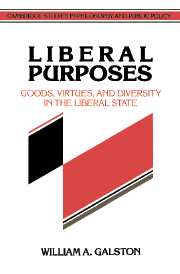Book contents
11 - Civic education
Published online by Cambridge University Press: 05 June 2012
Summary
Part III ended with a question: To what extent are the formal institutions and informal processes of American society engendering the virtues a liberal polity requires? This chapter and the next represent a more sustained meditation on this theme. This chapter explores the role, and limits, of civic education in producing virtuous citizens, and Chapter 12 explores the links between public virtue and religion. My overall thesis is that conceptions of civic education and the social role of religion can be defined that are at once faithful to liberal principles and far more hospitable to moral and religious traditionalism than is the understanding that dominates contemporary liberal theory.
In most times and places, the necessity and appropriateness of civic education have been accepted without question. It has been taken for granted that young people must be shaped into citizens and that public institutions have both the right and the responsibility to take the lead in shaping them. In the United States over the past generation, however, civic education has become intensely controversial. Some believe that our political and social arrangements can function perfectly well without publicly defined (or directed) civic education. Others doubt that any one specification of civic education can be devised for a liberal polity in which individuals, families, and communities embrace fundamentally differing conceptions of choice-worthy lives. Still others argue that any unitary civic education necessarily violates the autonomy and conscience of many individuals and groups in a diverse society.
- Type
- Chapter
- Information
- Liberal PurposesGoods, Virtues, and Diversity in the Liberal State, pp. 241 - 256Publisher: Cambridge University PressPrint publication year: 1991
- 2
- Cited by

